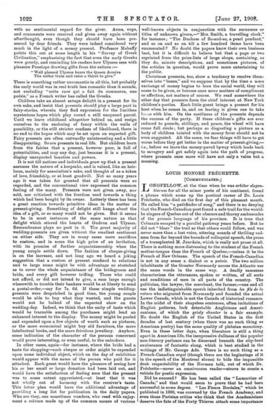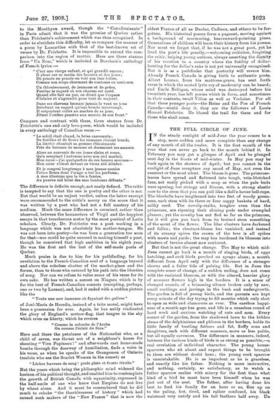ONGFELLOW, at the time when he was arbiter elegan-
tiarum for all the minor poets of his continent, found a phrase which sums up the poetical career of Dr. Louis Frechette, who died on the first day of this pleasant month. He called him "a pathfinder of song," and there is no denying that the French-Canadian poet found a safe trail for the would- be singers of Quebec out of the obscure and thorny ambuscades of the prosaic language of his province. It is true that Cremazie escaped by a parallel pathway years before. But he did not " blaze " the trail so that others could follow, and was never more than a lost voice, uttering sounds of thrilling sad- ness from far beyond the bounds of colloquial speech, the prose of a transplanted M. Jourdain, which is really not prose at all. There is nothing more distressing to the student of the French mother-tongue than the French of Quebec,—unless it be the French of New Orleans. The speech of the French-Canadian is not in any sense a dialect or a patois. The two million inhabitants of the Greater Normandy across the Atlantic use the same words in the same way. A deadly sameness characterises the utterances, spoken or written, of all sorts and conditions of men in all parts of the country. The politician, the lawyer, the merchant, the farmer,—one and all use the indistinguishable speech inherited from les fits de la roture who migrated from Normandy and founded the actual Lower Canada, which is not the Canada of historical romance. In the midst of their shapeless sentences, often imitations of English patterns, lurk detestable Anglicisms and Ameri- canisms, of which the grisly shunter is a fair example. No doubt the English of the United States in the firat decades of last century (when there was no such thing as American poetry) has the same quality of plebeian monotony. Even in these latter days, when literature is still a thing apart in American life, the inexpressive dullness of the popular non-literary parlance can be discerned beneath the city-bred exuberance of fantastic slang, which is best studied in the writings of Mr. George Ade. There is no such thing as a French-Canadian argot (though there are the beginnings of it in the speech of the Montreal slums) to hide the impossible drab respectability of the Norman talk, out of which Dr. Frechette—never an omnivorous reader—strove to create a vehicle for poetic expression.
Did he succeed ? He has been called the " Lamartine of Canada," and that would seem to prove that he had been successful in some degree. "Lee Fleurs Boreales," which he published in 1880, was crowned by the French Academy, and even those Parisian critics who think that the Academicians deserve the fate of the Forty Thieves attach some importance to the lionthyon award, though the " Canadienisante "
in Paris admit that it was the promise of Quebec rather than ,Frechette's achievement which was thus recognised. In order to elucidate this difficulty, let us compare the manner of
a poem by Lamartine with that of the best-known set of verses by Dr. Frechette. It is impossible to extend the com- parison into the region of matter. Here are three stanzas from '`Un Nom," which is included in Dorchain's anthology of French lyrics :— "C'est une vierge enfant, at qui grandit encore ;
Ii plant sur ce matin des beitutes et des jours ; De pensee en pensee on volt ton ilme eclore,
• Comma son corps oharmant de contours en contours.
Un eblouissement, de jeunesse et de grice, Famine le regard cia son eharme eat reste. Quand elle fait un pas, on dirait que respite° S'eclaire et eagrandit pour tact de majeste.
Dana sea cheveux bronzes jamais le vent no joue Derobant un regard qu'une boucle interrompt, fl serpentent colles as marbre de sa joue, Mont rombre pensive sun secrets de son front."
Compare and contrast with these, three stanzas from Dr. Frechette's one and only love-poem, which would be included in every anthology of Canadian verse :— " Le soleil etait chaud, la brise caressante ; De feuilles et de fleurs lea romeaux etaient lourds, La linotte chantait sa gamma eblouissante Pres du bereeau de mousse oa dormaient sea amours.
Alors an souvenir de ces jours °lairs at roses, Qu'a remplace l'automne avec son ciel marbre, Mon cceur—j'ai quelquefois de ces heures moroses- Mon cceur s'emut devant co vieux nid delabre.
Et je songeoi longtemps mes jeunes annees Preles fleurs dont rorage a tile lea parturns ; A mes illusions quo la vie a toffees, Au pauvre nid brise des mes bonheurs daunts."
The difference is definite enough, not easily defined. The critic is tempted to say that the one is poetry and the other is not. But that would be an unjust verdict, unless the latter excerpt were recommended to the critic's mercy on the score that it was written by a poet who had not a full mastery of his medium. Much the same difference is surmised, rather than observed, between the hexameters of Virgil and the happiest essays in that treacherous metre by the most poetical of Latin echolars. Clearly, Dr. Frechette was a poet working in a language which was not absolutely his mother-tongue. He was not born into poetry—he was born a generation too soon for that—nor could he quite succeed in making himself a poet, though he conceived that high ambition in his eighth year.
He was the first and the last of the self-made poets of Quebec.
Much praise is due to him for his pathfinding, for his revelation to the French-Canadian soul of a language beyond and above the echoless chatter of the market-place and the forum, than to those who entered by his path into the liberties of song. Nor can we refuse to value some of his verse for its own sake. He has written a sonnet on Niagara which is by far the best of French-Canadian sonnets (excepting, perhaps, one or two by Lozeau), and, had it ended with a sudden picture like the " Toute nue mer immense oh fuyaient des ganres " of Jose-Maria de Heredia, instead of a trite moral, might have been a possession for ever. Again, he has nobly vindicated the glory of England's meteor-flag, that tongue in the sky which cries on liberty, which he reveres "Comme is colombe de l'Arche On comma reclair du Sins."
Here and there the petulance of the Nationalist who, as a child of seven, was thrust out of a neighbour's house for shouting "Viva Papineau!" and afterwards cast home-made bombs through the doorway of humiliation, finds a voice in his verse, as when he speaks of the Orangemen of Ontario (zealots who see the Scarlet Woman in the sunset) as
"Litehes buveurs de sang ! pieds plats et fronts etroits." But the years which bring the philosophic mind widened the horizon of his political thought, and enabled him to contemplate the growth of British Canada with equanimity, expressed in
the half-smile of one who knew that Empires do not live by wheat alone. And it must be remembered that he did much to rebuke "the thanklessness of history" which had caused such makers of the "New France" that is now the
oldest France of all as Dania; Cadieux, and others to be for- gotten. His historical poems form a pageant, moving against a background of murmuring, heavenward-pointing pines. Generations of children will learn their history from his poems. Nor must we forget that, if he was not a great poet, yet he lived the poet's life greatly,—welcoming criticism, forgiving the critic, helping young authors, always asserting the dignity of his vocation in a country where the futility of dollar- hunting for the dollar's sake is not yet universally recognised. But it is as a pathfinder that posterity will revere him. Already French Canada is giving birth to authentic poets. Albert Lozeau, from his mattress-grave, has sent forth verse in which the muted lyric cry of modernity can be heard; and Emile Nelligan, whose mind was destroyed before his twentieth year, has left poems which in form, and sometimes in their contents, recall Villon as well as Verlaine. For all that these younger poets—the Heine and the Poe of French Canada—would deny it, they are the followers of Louie Honore Frechette. He blazed the trail for them and for those who shall come.























































 Previous page
Previous page